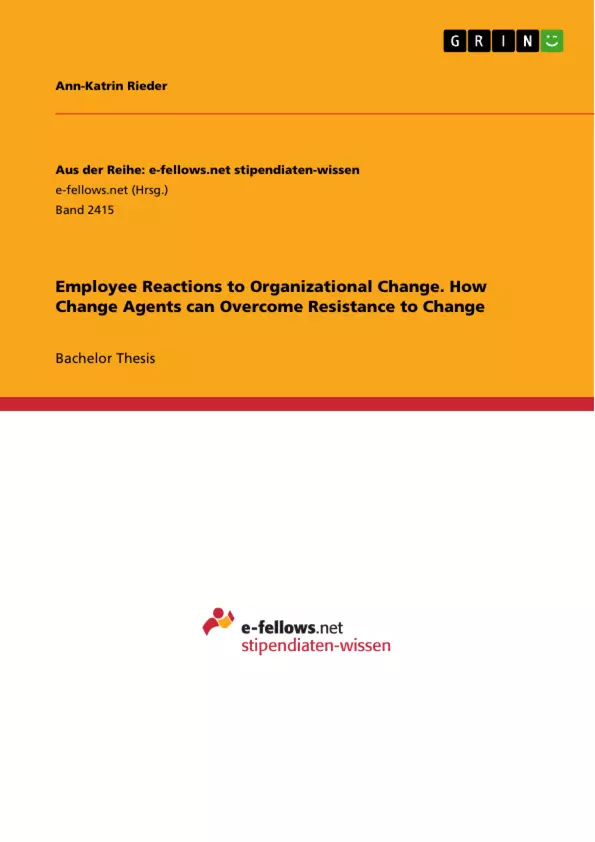Nowadays, organizations are continuously changing. Frequently, due to a changing business environment, companies are forced to rethink their strategic direction and structure in order to remain competitive. New government regulations, growth, increasing competition, changing customer needs and technological developments are only some of the causes for an organization to change. The fact that nowadays change is inevitable in organizations and that still many change initiatives fail, aroused my interest in the topic. Especially, I want to find out what happens when human variables are taken into account. The main goal of my thesis is to examine the role of a change agent. What strategies can he or she use to overcome resistance as a major employee reaction to organizational change?
Table of Contents
- 1 Introduction
- 2 Employees Reactions to an Organizational Change
- 3 Resistance to Change
- 3.1 Definitions of Resistance to Change
- 3.2 Reasons for Resistance to Change
- 3.3 Forms of Resistance to Change
- 3.4 Positive Aspects of Resistance to Change
- 4 The Role of the Change Agent in Overcoming Resistance to Change
- 4.1 Information Dissemination
- 4.2 Crafting a Vision
- 4.3 Participation
- 4.4 Providing Support
- 4.5 Other Strategies
- 5 Conclusion
Objectives and Key Themes
This thesis aims to investigate the role of a change agent in overcoming resistance to organizational change, a common obstacle to successful implementation. It delves into the various reactions employees exhibit towards organizational change, focusing on resistance as a significant response.
- Employee Reactions to Organizational Change: Exploring affective, cognitive, and behavioral responses to change initiatives.
- Understanding Resistance to Change: Defining resistance, examining its causes, and analyzing various forms of resistance.
- The Role of the Change Agent: Investigating the importance of change agents in contemporary organizations and their strategies for overcoming resistance.
- Change Management Strategies: Analyzing information dissemination, vision crafting, participation, providing support, and other strategies to facilitate successful change.
- Positive Aspects of Resistance: Recognizing the potential benefits of resistance and its contribution to constructive change processes.
Chapter Summaries
Chapter 1 introduces the context of organizational change in today's business environment, highlighting the frequency and inevitability of change. It emphasizes the significance of employee reactions to change, particularly resistance, and identifies the gap in existing literature that focuses on a macro perspective rather than individual reactions. The main objective of the thesis is established: to analyze the role of the change agent in overcoming resistance.
Chapter 2 examines employees' reactions to organizational change based on Oreg, Vakola and Armenakis' (2011) "Model of Change Recipient Reactions to Organizational Change." It categorizes these reactions into affective, cognitive, and behavioral responses, providing examples and research findings on each category. Chapter 2 focuses on the affective reactions of employees, exploring both positive and negative emotional responses to change, such as excitement, fear, stress, and hope. Cognitive reactions, involving employees' interpretations and evaluations of the change, are also discussed, highlighting the importance of sensemaking in organizational change.
Chapter 3 delves into the concept of resistance to change, examining definitions, causes, and forms of resistance. It addresses the reasons behind resistance, including fear of the unknown, loss of control, and perceived threats to job security. Various forms of resistance, ranging from passive-aggressive behaviors to open confrontation, are explored. This chapter concludes by recognizing the positive aspects of resistance, emphasizing its potential to provide valuable feedback and contribute to constructive change processes.
Chapter 4 focuses on the role of the change agent in overcoming resistance to change. It underlines the importance of change agents in contemporary organizations, their responsibility for successful change implementation, and the strategies they can utilize to overcome resistance. This chapter will discuss the role of information dissemination in fostering employee understanding and acceptance of change. It will analyze the process of crafting a compelling vision that outlines organizational goals and future direction. The importance of employee participation will be examined, including its various forms and consequences. The chapter will also discuss the vital role of providing support to employees throughout the change process. Finally, it will explore additional strategies that change agents can implement to manage resistance effectively.
Keywords
This thesis explores the key themes of organizational change, employee reactions, resistance to change, and the role of change agents in fostering successful change implementation. It utilizes a micro-level perspective to analyze individual employee responses to organizational change, particularly resistance. Central concepts explored include information dissemination, vision crafting, participation, support provision, and other strategies for managing resistance. The thesis draws on existing research and models in the field of organizational change management to provide a comprehensive understanding of the relationship between employees, change initiatives, and the role of change agents in navigating the complexities of organizational transformation.
Frequently Asked Questions
What is a Change Agent's role in an organization?
A change agent is responsible for implementing and managing organizational change. Their role involves using strategies to overcome employee resistance and facilitating a smooth transition to new structures or directions.
Why do employees resist organizational change?
Common reasons include fear of the unknown, loss of control, perceived threats to job security, and a lack of understanding regarding the necessity or benefits of the change.
What strategies can be used to overcome resistance to change?
Effective strategies include transparent information dissemination, crafting a compelling vision, encouraging employee participation, and providing continuous support throughout the process.
Can resistance to change have positive aspects?
Yes, resistance can provide valuable feedback. It can highlight flaws in the change plan and contribute to a more constructive and refined change process if managed correctly.
What are the different types of employee reactions to change?
Reactions are categorized into affective (emotions like fear or excitement), cognitive (interpretations and evaluations), and behavioral (actions like support or resistance) responses.
- Citar trabajo
- Ann-Katrin Rieder (Autor), 2015, Employee Reactions to Organizational Change. How Change Agents can Overcome Resistance to Change, Múnich, GRIN Verlag, https://www.grin.com/document/369404



